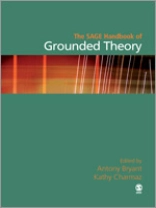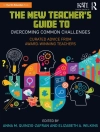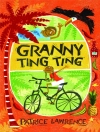′Tony Bryant and Kathy Charmaz are the perfect editors for this excellent and forward looking Handbook which is surely destined to be a classic′
– David Silverman, Professor Emeritus, Goldsmiths College
For anyone interested in grounded theory this is a must have book. No longer will students have to search the library or internet to find authoritative voices on a variety of topics. It′s all right there at their fingertips
– Juliet Corbin, San José State University
Grounded Theory is by far the most widely used research method across a wide range of disciplines and subject areas, including social sciences, nursing and healthcare, medical sociology, information systems, psychology, and anthropology. This handbook gives a comprehensive overview of the theory and practice of Grounded Theory, taking into account the many attempts to revise and refine Glaser and Strauss′ original formulation and the debates that have followed.
Antony Bryant & Kathy Charmaz bring together leading researchers and practitioners of the method from the US, the UK, Australia and Europe to represent all the major standpoints within Grounded Theory, demonstrating the richness of the approach. The contributions cover a wide range of perspectives on the method, covering its features and ramifications, its intricacies in use, its demands on the skills and capabilities of the researcher and its position in the domain of research methods.
The SAGE Handbook of Grounded Theory is an indispensable reference source for academics and researchers across many disciplines who want to develop their understanding of the Grounded Theory method.
Зміст
PART ONE: ORIGINS AND HISTORY
Grounded Theory in Historical Perspective: An Epistemological Account – Antony Bryant & Kathy Charmaz
Discovery of Grounded Theory in Practice: The Legacy of Multiple Mentors – Eleanor Krassner Covan
Living Grounded Theory: Cognitive and Emotional Forms of Pragmatism – Susan Leigh Star
PART TWO: GROUNDED THEORY METHOD AND FORMAL GROUNDED THEORY
Doing Formal Theory – Barney G Glaser
On Solid Ground: Essential Properties for Growing Grounded Theory – Phyllis Noerager Stern
From the Sublime to the Meticulous: The Continuing Evolution of Grounded Formal Theory – Margaret H Kearney
Orthodoxy versus Power: The Defining Traits of Grounded Theory – Jane Hood
PART THREE: GROUNDED THEORY IN PRACTICE
Grounding Categories – Ian Dey
Development of Categories: Different Approaches in Grounded Theory – Udo Kelle
Abduction: The Logic of Discovery of Grounded Theory – Jo Reichertz
Sampling in Grounded Theory – Janice Morse
Asking Questions of the Data: Memo Writing in the Grounded Theory Tradition – Lora Lempert
The Coding Process and Its Challenges – Judith Holton
PART FOUR: PRACTICALITIES
Making Teams work in Conducting Grounded Theory – Carolyn Wiener
Teaching Grounded Theory – Sharlene Nagy Hesse-Biber
The Evolving Nature of Grounded Theory Method: The Case of the Information Systems Discipline – Cathy Urquhart
PART FIVE: GROUNDED THEORY IN THE RESEARCH METHODS CONTEXT
Grounded Theory Using Situational Analysis – Adele E Clarke and Carrie Friese
What Can Grounded Theorists and Action Researchers Learn From Each Other? – Bob Dick
Feminist Qualitative Research and Grounded Theory: Complexities, Criticisms, and Opportunities – Virginia L Olesen
Accommodating Critical Theory – Barry Gibson
Grounded Theory and the Politics of Interpretation – Norman K Denzin
Grounded Theory & Racail/ Ethnic Diversity – Denise O′Neil Green, John W. Creswell, Ronald J. Shope, Vicki L. Plano Clark
Advancing Ethnographic Research Through Grounded Theory Practice – Stefan Timmermans and Iddo Tavory
PART SIX: GROUNDED THEORY IN THE CONTEXT OF THE SOCIAL SCIENCES
Grounded Theory and Reflexivity – Katja Mruck and Guenter Mey
Mediating Structure and Interaction in Grounded Theory – Bruno Hildenbrand
Rational Control and Irrational Free-play: Dual-thinking Modes as Necessary Tension in Grounded Theorizing – Karen Locke
Research as Pragmatic Problem-solving: The Pragmatist Roots of Empirically-grounded Theorizing – Joerg Struebing
Про автора
Kathy Charmaz was Professor Emerita of Sociology and the former director of the Faculty Writing Program at Sonoma State University. She joined the first cohort of doctoral students at the University of California, San Francisco, where she studied with Anselm Strauss. She wrote in the areas of social psychology, medical sociology, qualitative methods, and grounded theory, and over her career wrote, coauthored, or coedited 14 books, including two award-winning works: Good Days, Bad Days; The Self in Illness and Time, and Constructing Grounded Theory. She received the George Herbert Mead award for lifetime achievement from the Society for the Study of Symbolic Interaction, the Leo G. Reeder award for distinguished contributions from the Medical Sociology Section of the American Sociological Association and the Lifetime Achievement award from the International Congress of Qualitative Inquiry. Professor Charmaz also gave workshops on qualitative methods, grounded theory, symbolic interactionism, and scholarly writing around the globe.












